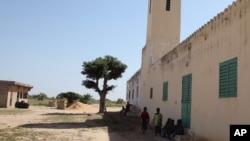Dozens of armed security forces descended on the Quranic school at night, arresting an imam suspected of having links to Islamic extremists in Nigeria.
As the forces encircled the home of Imam Alioune Badara Ndao, 300 boys from his boarding school ran into the dirt courtyard, panicked at the sudden appearance of the gendarmes in this peanut-industry town.
More arrests were carried out in the weeks that followed, including of three other imams accused of supporting Boko Haram, stoking fears that extremism could be sprouting in this predominantly Muslim, moderate nation that prides itself on its tolerance and co-existence with the Christian minority population.
"Until now the debate on terrorism was considered a distant one, but with these new arrests Senegalese perception has completely changed,'' said Bakary Sambe, an expert on radicalism and religious conflict in Africa who is based at Gaston Berger University in Saint-Louis, Senegal. "People are starting to see this as a local reality."
Authorities said they found a video on the night of Ndao's arrest at the Quranic school last October that they said "glorified terrorism'' and believe the imam had been meeting regularly with a Senegalese jihadist looking to set up a Boko Haram cell here after living and training in Nigeria.
Ndao vigorously denies the accusations.
Recent al-Qaida attacks on hotels frequented by foreigners in two other West African countries, Mali and Burkina Faso, that killed dozens of people have elevated fears that extremist attacks are creeping further out from North Africa. Even before the Burkina Faso attack, Senegal's president was calling for the burqa to be banned, saying the long shapeless garment worn by conservative Muslim women also could be used by suicide bombers to hide explosives.
Senegal is stepping up security at possible targets, including large hotels and foreign embassies. Authorities are increasing surveillance too. Police have detained more than 500 people in Senegal this year as part of an anti-extremism effort though most offenses were for counterfeit currency or not having the proper paperwork for vehicles.
In Kaolack, some 112 miles (180 kilometers) from the capital, there is still shock over the raid and disbelief that Ndao could have supported Boko Haram, a Nigerian group which has pledged allegiance to the Islamic State. Neighbors and supporters say Ndao is well-respected in the community and led a local league of imams and preachers. His attorney insists any jihadist propaganda found on the premises were for research.
"Imam Ndao is a scholar who is doing research on terrorism, and so it is not surprising that he would have this video,'' says his lawyer Babacar Ndiaye.
However, others maintain that the connection between Ndao and the extremist group is far more direct, including regular meetings with the Senegalese jihadist named Makthar Diokhane who is currently jailed in Niger and accused of trying to set up a Boko Haram cell in his home country with at least four accomplices also being held in Niger.
It was Diokhane's travels that apparently led authorities to arrest the imams, as his movements were being tracked by intelligence services from at least two countries before he was arrested last year.
Diokhane had visited Ndao at his Quranic school in Kaolack on several occasions. The imam's lawyer, though, insists Diokhane was a former student whom the imam had lost touch with until only very recently.
Diokhane's wife was also arrested, allegedly in possession of more than 23,000 euros worth of currency.
Now the four imams, Diokhane's wife and a second woman are facing a variety of charges ranging from money laundering to financing terrorism.
For some, Ndao's arrest merely amounts to guilt by association - no information released publicly has implicated any of the suspects in plotting a specific attack or recruiting others to violent jihadism.
"Our imam is someone who tells us what the Quran says and nothing else,'' said Kadidja Thiam, one of the imam's neighbors and supporters.




